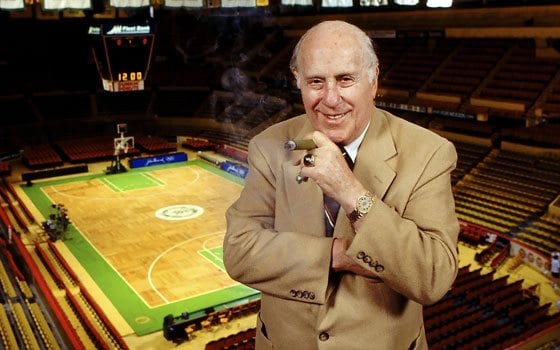
Red Auerbach did not think of himself as a civil rights activist . Yet the Boston Celtics coach’s hiring of black athletes for the Boston Celtics in the 1950’s proved as historic as the professional debut of Jackie Robinson in baseball in the 1940’s.
Auerbach always spoke of hiring the best players for their respective positions on the team regardless of their race and practiced what he preached in making Chuck Cooper in 1950 the first African American player to be drafted in the NBA.
Veteran journalist Ken Dooley, probably Arnold Jacob Auerbach’s closest friend during his later years, has given ample time to this accomplishment as well as the legendary coach’s lifetime of achievement in a lively and informative new play called “The Auerbach Dynasty.”
Under Dooley’s own effective direction, veteran local actor Jeff Gill is giving full court coverage to this fascinating one-man play at Watertown’s Arsenal Center for the Arts and making this Brooklyn-to-Boston saga as satisfying as successful three-point shots.
Veteran local actor Jeff Gill plays Auerbach, against a backdrop of valuable photos and video projections by Steve Lipofsky, the official Celtics photographer for 23 years.
In the play, an older Auerbach looks back on his achievements without fanfare — among them, the hirings of Cooper and such legendary African American players as Bill Russell, Sam Jones, K.C. Jones and Tom Sanders. Dooley’s play also cites a quote by Harlem Rens coach Bobby Douglas about Auerbach’s 1950 selection of Cooper: “You just did for basketball what Branch Rickey did for baseball” (referring to the Dodgers’ picking up Jackie Robinson in 1947).
“The Auerbach Dynasty” points as well to such other civil rights milestones as Russell becoming the first black coach in the NBA and the Celtics having the first black starting five. Newer and older Celtics fans alike will warm to the play’s engaging chronicle of Auerbach’s nine NBA championships as coach and seven as general manager.
Dooley has also wisely included material about Auerbach’s childhood and highlights of the Jewish Brooklynite’s own playing career in high school and college . Red (nicknamed for his early red hair and fiery personality) recalls his fellow players in the Williamsburg section of Brooklyn — a mixture of Jews, Irish, Poles, Germans, Italians and blacks.
There is a vivid vignette about his agreement with his Russian Jewish father, Hyman Auerbach, that he could play basketball — which his father did not favor — if he also worked in his dry cleaning shop.
There is also an insightful passage about the enormous influence of coach Bill Reinhart at George Washington University, for whom Auerbach played. Mentor-like Reinhart taught Auerbach the importance of team play and the fast break – lessons he would employ in revolutionizing professional basketball.
Other notable passages in the play involve Red’s evolving rapport with Bob Cousy and a striking exchange with Bill Russell about prejudice.
Gill, one of the Hub’s finest character actors, fully captures Auerbach’s spirit and personality- with crisp gestures, properly confident body language and evocative signature triumphant rings of cigar smoke.
There are some minor design quibbles that can be easily resolved. Sometimes the projected photos needed sharper synchronization with Red’s monologue. Also, the relatively spare set could do with some backdrop championship banners and highlighting of Auerbach’s wise sayings.
Even so, “The Auerbach Dynasty” is as majestic and memorable as its subject.
Dooley’s basketball chronicles will continue in his next book , “From White to Black,” a non-dramatic work (on which he has enlisted help from Sam Jones and K.C. Jones) that examines the development of the NBA from the largely white team s of the 1950’s (only about 15 black players) to the largely black teams (about 90 per cent) of today.





